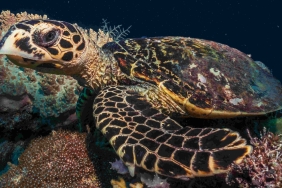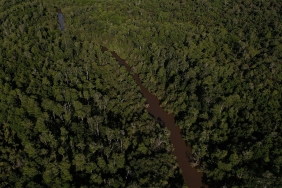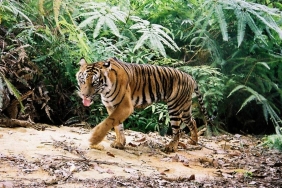WWF SUSTAINABLE FINANCE REGULATION (SUSREG) 2024: CLIMATE RISK INTEGRATION CONTINUES TO STRENGTHEN, NATURE-RELATED RISKS NEED TO BE STRENGTHENED
Jakarta, February 26, 2025 - WWF released the 4th Sustainable Finance Regulations and Central Bank Activities (SUSREG) report on environmental, social, and governance (ESG) for financial regulators in 52 countries. The integration of ESG in financial sector policies enables financial institutions such as banks to mobilize funds to finance sustainable investments. WWF-Indonesia presented the results of the 2024 report on the development of sustainable finance through the SUSREG report and its relationship with the development of banking through the Sustainable Banking Assessment (SUSBA) report in Indonesia which shows the effectiveness in the implementation of regulations
In the SUSREG 2024 report, it was noted that climate risk management in Indonesia was strengthened by issuing a series of climate risk-related guidelines by the Financial Services Authority (OJK). In addition, the report also shows an increase in regulatory expectations for climate strategy and management to be implemented by banks as measured by the rise of three criteria from last year while expectations for the sub-pillars of implementing compliance, risk management, and internal audit functions (three lines of defense) in climate aspects have also increased.
Previously, WWF also published the SUSBA 2024 report that can measure the implementation of the sustainable banking industry in Asia. Based on SUSBA's maturity level, 75% of the 11 banks assessed have entered the recognition phase and more than 50% have met the implementation phase. It is noted that seven of the 11 banks assessed by SUSBA have conducted climate risk analysis and started to develop management strategies for relatively simple climate risks.
The SUSREG report also noted progress on the central bank side. One form of realization is the implementation of the Board of Governors' Regulation (PADG) 11/2023 on the Implementation Regulation of the Macroprudential Liquidity Incentive Policy (KLM). Through this policy, Bank Indonesia provides liquidity incentives in the form of a reduction in the reserve requirement (GWM) for banks that channel financing to environmentally sound sectors. The incentives stimulated the distribution of sustainable financing, with several members of the Indonesian Sustainable Finance Initiative (IKBI) developing products such as green bonds, sustainability-linked loans, and other instruments. The total green financing instruments recorded reached IDR 52 trillion by the end of 2024. WWF assesses that the policy is positive for the development of sustainable finance products in Indonesia, but there is still a need for uniform standardization and sustainable criteria that have an impact with a high level of interoperability.
Irfan Bakhtiar, Director of Climate and Market Transformation, WWF-Indonesia said that "strengthening the infrastructure and capacity of banks in managing climate risks and opportunities is an important step. WWF welcomes the development of policies and guidelines related to sustainable finance launched by financial regulators. Such as the Indonesian Taxonomy of Sustainable Finance (TKBI) and guidelines related to climate risk management developed by OJK, as well as green economy macroprudential liquidity incentives rolled out by Bank Indonesia. Without proactive measures, the banking industry risks facing higher and unpredictable costs."
The findings of the World Economic Forum (WEF) show a very high economic dependence on nature. More than 50% of the world's GDP depends on the preservation of nature. The findings of the United Nations Environment Programme Finance Initiative (UNEP FI) also confirm net zero is unattainable if nature degradation continues. This points to the need for corporate climate strategies that consider nature conservation and restoration. This is made even more challenging by the 73% decline in wildlife populations over the past five decades, with freshwater species most at risk (WWF's Living Planet Report 2024).
Rizkia Sari Yudawinata, Sustainable Finance Lead, WWF-Indonesiasaid that "managing risks and business opportunities related to climate and nature cannot be done separately. Both are interrelated and do not stand alone. This is in line with the Do No Significant Harm (DNSH) principle applied in the Indonesian sustainable taxonomy (TKBI) to ensure that investments related to net zero, both direct and indirect, do not have negative social and environmental impacts."
"Monetary policy instruments such as GWM and KLM can be further optimized to stimulate financing to support the achievement of sustainability targets. One way is by aligning criteria that are in line with TKBI," added Rizkia.
To support the development of holistic climate and environmental risk management in the country, WWF-Indonesia has initiated a capacity-building program related to the importance of climate risk integration to banks, furthermore on nature-related risks through the adoption of the Task Force on Nature-related Financial Disclosures (TNFD) for the next five years. The training program will kick-start the Indonesia Nature-positive Forum to strengthen the coordination and alignment of actions and policies among stakeholders.
Media liaison:
Karina Lestiarsi, Communication Officer WWF-Indonesia
klestiarsi@wwf.id / +62 852-181-616-83
Editor's Note:
In 2021, WWF launched for the first time the Sustainable Financial Regulations and Central Bank Activities (SUSREG) assessment to evaluate social and environmental risks integrated with regulatory and supervisory practices such as central bank and other financial activities.
The countries assessed are mainly members and observers of the Basel Committee on Banking Supervision (BCBS), the International Association of Insurance Supervisors (IAIS), and the Network of Central Banks and Supervisors for Greening the Financial System (NGFS). The assessment is published annually with an annual report. This year's assessment indicators have been expanded to cover issues such as the gradual transition of central bank change plans, water-related risks, the availability of SME guidelines, and the sustainable issuance of government bonds.
More information: https://susreg.panda.org/
About SUSBA
Sustainable Banking Assessment (SUSBA), was first launched (SUSBA) in 2017 to assess the progress of integration of social and environmental aspects in bank financing. SUSBA is one of the publicly accessible performance measurement instruments for the adoption of ESG principles to promote transparency in the financial sector and facilitate decision-making by stakeholders.
SUSBA adopts international frameworks, standards and guidelines, such as those issued by the Global Reporting Initiative (GRI), United Nations Environment Programme Finance Initiative (UNEP FI), Task Force on Climate-related Financial Disclosures (TCFD), and Sustainability Accounting Standards Board (SASB).
Complete access to SUSBA Asia-Pacific region: https://www.wwf.sg/susba/.
Indonesian Sustainable Finance Initiative
The Indonesia Sustainable Finance Initiative (IKBI) is a multi-stakeholder platform established on May 31, 2018, with members representing more than 80% of national banking assets, infrastructure finance companies, and WWF-Indonesia, to accelerate the implementation of inclusive sustainable finance in Indonesia.
IKBI has a 3-pillar approach to creating a level playing field for financial institutions to achieve sustainability goals such as Sustainable Development Goals (SDGs), the Paris Agreement, and the Global Biodiversity Framework (GBF), through enhancing ESG integration, capturing business opportunities and mobilizing financing, and developing solutions.
IBI members: BRI, Mandiri, BCA, BNI, CIMB Niaga, BSI, BTN, SMBC, HSBC, Muamalat, Maybank, Panin Bank, OCBC NISP, PT Sarana Multi Infrastruktur, WWF-Indonesia.
About WWF Indonesia
The WWF Indonesia Foundation is an Indonesian-incorporated civil society organization engaged in nature conservation and sustainable development. Our mission is to halt environmental degradation and build a future where people live in harmony with nature, through the conservation of the world's biodiversity, the sustainable use of renewable natural resources, and the reduction of pollution and overconsumption.
For the latest news, visit www.wwf.id and follow us on X (Twitter) @wwf_id | Instagram @wwf_id | Facebook WWF-Indonesia | Youtube WWF-Indonesia





